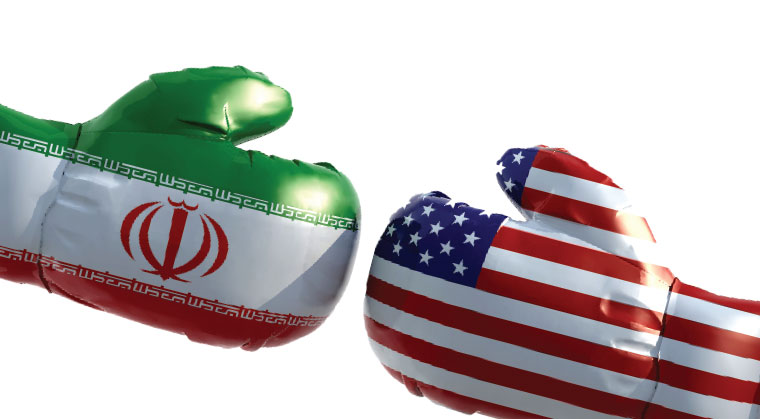Warsaw Confab to Talk Tough on Tehran


Secretary of State Mike Pompeo announced that the United States is convening an international conference in Warsaw, Poland, on February 13 and 14 that will “focus on Middle East stability and peace and freedom and security… and that includes an important element of making sure that Iran is not a destabilizing influence.” In the wake of the Trump administration’s withdrawal last year from the Joint Comprehensive Plan of Action (JCPOA, better known as the Iran nuclear deal), the gathering seems to intended to reach consensus with European allies on other aspects of the Iranian challenge.
An interesting mix of dignitaries will attend, with representatives from Europe and the Arab world, and, of course, Israel.
The State Department lists four topics on the agenda:
- regional crises and their effects on civilians in the Middle East;
- missile development and proliferation;
- cybersecurity and emerging threats to the energy sector; and
- countering extremism and illicit finance.
“Countries will come together to prioritize these regional challenges, share information, and discuss how we can cooperate more effectively to address them,” said a State Department press release.
Is Pompeo engaging in a publicity stunt? Or are the Americans removing another brick from the international defense wall that the JCPOA provided for Iran? I asked Michael Pregent, a Hudson Institute senior fellow and former US intelligence agent who is an expert on the Iranian Revolutionary Guards.
“I think it’s just a way to say, ‘Listen, this is not just about the nuclear portfolio, this is about everything Iran did under the protections of the JCPOA,’ ” Pregent said. “I hope it’s not a PR stunt. I know Pompeo and [National Security Advisor John] Bolton would be serious about it. The president may use it as a PR stunt, but I think the secretary of state was actually very serious about this.”
The gathering is officially defined as a “ministerial,” a summit for foreign ministers. Although Federica Mogherini, the EU high representative for foreign affairs, won’t be coming, the UK, France, and Germany will send delegations; and Saudi Arabia, the United Arab Emirates, Kuwait, and Oman will also be represented.
Israel’s foreign minister also happens to be its prime minister, Binyamin Netanyahu. We don’t know yet whether we will get to see a photo op of Netanyahu standing alongside Arab representatives against Iran. Such an image would no doubt send a powerful message across the world. Netanyahu would like nothing more than to announce the secret ties that have developed between Israel and the Arab world. His recent visits to Chad and Oman have broadly hinted at this, but we still haven’t seen a historic breakthrough, such as a joint Israeli-Saudi maneuver against their common enemy in Tehran.
With the summit, the US hopes to signal that it has no intention of reducing pressure on Iran, that withdrawal from the nuclear deal wasn’t a one-off. Given this background, it will be interesting to see whether European allies will send cabinet-level representation to the summit. Although UK foreign secretary Jeremy Hunt has booked a reservation, France and Germany may send only a lower-level delegation.
The Europeans, at least officially, maintain they are still totally committed to the JCPOA, but Iranian actions may cause them to change their tune. European investigators recently brought to light an Iranian scheme to carry out terror attacks in Denmark, France, and Holland. The EU is slowly waking up to the reality that the JCPOA did nothing to moderate Iranian aggression. Tehran continues to sponsor a worldwide, multipronged campaign of cyber warfare, attacks on civilians, and funding for terror groups.
Earlier this month, in a rare show of assertiveness, the EU placed sanctions against Iranian intelligence. Ties between the EU and Iran are at a nadir — a development not lost on Pompeo, who’s interested in further isolating the mullahs’ regime.
As it turns out, the summit will occur as another crisis plays out around the globe: the collapse of regime legitimacy in Venezuela, where Nicolas Maduro has one foot out the door. The US, UK, France, Germany, and Spain have already recognized opposition leader Juan Guaid? as Venezuela’s interim president. Trump administration officials may be hoping the united front against Maduro could provide a template for future action on Iran.
“I think the best thing that could happen to the United States is for the Iranian opposition to look at what the Venezuelan opposition is doing and try to organize that way, have a government in waiting, have a legitimate opposition leader that the US could get behind who is not controversial,” said the Hudson Institute’s Michael Pregent. “That’s the one thing that I think the Iranian opposition could learn from the Venezuela situation. The US is willing to back what they see as legitimate opposition leader. The problem is, in Iran there is no leader of this opposition.”
(Originally featured in Mishpacha, Issue 747)
Oops! We could not locate your form.













